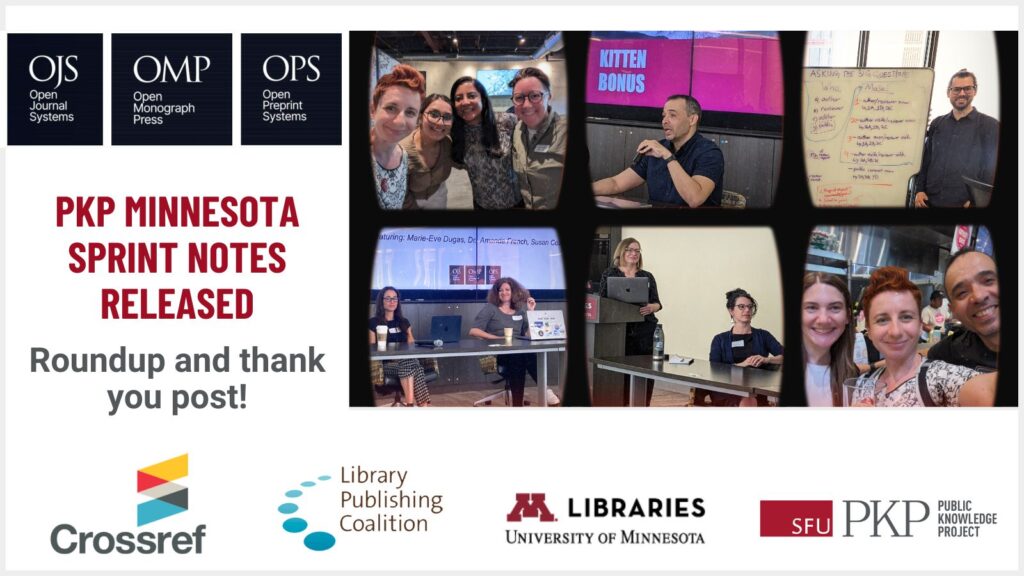
The sprint notes roundup from six working groups at the PKP Minnesota Sprint, hosted by the University of Minnesota Libraries in May 2024, is now available!
It takes a variety of stakeholders to develop open infrastructure for scholarly publishing and the global public good. PKP Sprints are not only about inviting those with technical expertise to help further the mission, but are also about working with diverse user communities.
We need to hear from folks using PKP software at all levels to do our best work. Last May, we were fortunate and thankful to have folks registered for the Sprint and LPF Pre-Conference Event from (in no particular order) the Library Publishing Coalition, Crossref, University of Minnesota Libraries, University of Alberta, Érudit, University of Kansas Libraries, Alta, Invest in Open Infrastructure, Bangladesh Bioethics Society, Indiana University, Lyrasis, AJPS Publications, Tlemcen Abou Bekr Belkaid University, CNRST, CUNY, University of Edinburgh, Coko Foundation, Texas State University, Naif Arab University for Security Sciences, and Penn State University.
In this post, we recap PKP Sprint Notes from six working groups at #pkpMin2024 that you will want to check out. Click on the working group titles to access their detailed summaries.
Working Group #1 – Documentation
Documentation is one of the primary ways that Open Journal Systems (OJS) users, including researchers and editors, interact with PKP. Good documentation also saves time, both for the software users themselves and for the service providers (like library publishers) who are supporting journal managers and editors. Learning OJS 3 is one of PKP’s most used documentation, and this group worked on previously identified needs such as audience specificity, information density, and “quick” procedural documentation.
Working Group #2 – Open Peer Review
Open peer review is an important review model currently not fully supported by OJS. This group conducted an overview of existing open peer review implementations, conceptualized the various aspects of open peer review, and explored three possible workflows in OJS. Next steps include having these considerations in GitHub discussions, put this functionality on the OJS development roadmap, and invite community feedback to help determine which workflow to prioritize.
Working Group #3 – Continuous Publication
Continuous publication includes both “rolling publication” (publishing individual articles as they are ready) and “forthcoming publication” (publishing “author’s version” articles before the formal layout and page numbering). This group found some outstanding issues, received updates on them, and discussed possible resolutions. Some next steps include developing the capability for an editor to be delivered to the “article ordering view” when an article is assigned to “continuous publishing”, refining notification functionalities, and publishing documentation outlining solutions.
Working Group #4 – Accessibility
Many OJS themes do not meet the requirement of conforming to Web Content Accessibility Guidelines (WCAG) 2.2 AA yet, and only the Default Theme is actively being developed at the moment. This working group discussed accessibility improvements in the article landing page, covering the Download and References sections, and the HTML galley button for an alternative viewing. In the end, they also talked about adding accessibility information to the plugins that developers submit to the gallery.
Working Group #5 – Plugin Development
OJS implements a general-purpose journal publication platform and workflow, but specific user communities often need it to be set up in a certain way. This group experimented with writing a plugin for OJS that could check to see whether those configuration needs were met. Following a plugin approach, a particular user community or indexer could release a plugin to the Plugin Gallery so that community members could easily check whether their journal is configured as needed.
Working Group #6 – Discussion Workflow
Discussion workflow is an important topic for developing PKP scholarly publishing software so that workflows, usability and transparency can be enhanced. This group brainstormed creating discussion forums so that they would be easier to reply to and connect to emails than in the past. Discussion workflow brainstorming included task creation scoping and email notifications and discussions. The resulting templates will hopefully influence new and improved features for journal workflows.
Thank You
PKP’s free and open software is now being used by more than 44,000 journals worldwide to increase access and reach of scholarly publishing. We once again thank the Sprint sponsors, host institutions, and all participants for their valuable contributions to PKP software. Special thanks to University of Minnesota Libraries, Library Publishing Coalition (LPC), and Crossref for their support and partnerships during this sprint. And a big happy Ten Year Anniversary to the LPC!
